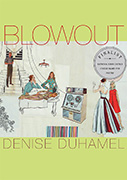My Sister Sings Reba at Forty-Three
for Shawna
To worship the earth, we barefoot down
to the water because we have never been
clean, and for this dirty mercy, my sister
kneels in her wet suit to the smell of surf
wax at 7 AM, kneels to the car key stashed
in the wheel well and the first open eye
full of ocean, and yes, Lord, no way around it,
my sister, today, will accept a broken nose full
of the granite reef handed down to her
by the gods of the southwest swell. By blood,
by green, by mud, by tide, my sister will be
held under by the world, but because she swans
back to the surface punched out of breath
but having survived, my sister kneels
to pray in the key of steel guitar and sunshine
to the ripped-down posters of old rodeos,
to the wet way of hay on a boot heel, to the tush-
push and the electric slide and the wide
mouthful of wild she finds while surfing
the hot highway home in the back of a golden
Ford F-150. My sister survives, and you could call
my sister the breeze these many July mornings,
but my sister does not soar like a sky on nights
when beneath the weight of the pistol
in her waist she serves with a police badge of shine
across San Francisco, for my sister must know
how a kid’s face caves in on the Fourth of July
after a firework has flown half-way through it,
and my sister must kneel to find a dead father
in the street on the double-yellow line,
to find a runaway daughter, to survive
a man standing in a creek at midnight, firing
a rifle at God. My sister knows the trauma
as water, the song as rugged, the body as sinking,
so, Lord, thank you for saving my sister who sings
with what it means to be the bull and the rider
and the war paint melting down the face of a rodeo
clown, what it means to chase a smile around
a filthy ring, yes, Lord, to chase the next wave,
or the next dance of tight asses in Wrangler pants,
or a next of kin, or the last long finishing note
of the evening before loading up the truck
with loneliness and heading home because, finally,
Lord, in the filthy bar, here we are, and, finally,
Lord, here before us rises my sister like an ocean
beside the microphone while muddy lights crumble
down dirty upon the black cowboy hats of the country
band, and by brown bottles of California mud, here, the filthy
chords are about to start, and my sister saunters up
in the armor of a leather jacket, of purple lipstick, of steel teeth,
of burgundy boots, and you who are listening should hold
your breath because my sister’s got a tattoo
of a bull on the wave of her back, and she’s going
to buck you off, and she’s going to elbow you down
deep because my sister knows how long to hold you under,
and how to save you, and how to kill you, and how to tell you
someone you love is dead, someone you love is still alive.
My Heart Is a Time Machine
Another brother’s funeral has ended,
and I must take my body back
to May of 1999
to stop the sunshine,
must begin again in our hotel room
with the girl
too drunk on Wild Turkey
to stand, the girl
hoisting a full keg
of Keystone Light
up onto her shoulder,
the girl grenading the keg
through the coffee table,
the girl leaping up onto the bed,
the girl taking three fan blades
to the face
that send her somersaulting all the way
through our hotel window
and onto the sidewalk outside.
I’ll forgive you for laughing
as my friend, Devon,
and I
and the whole room are now
because my friend, Devon, and I
are twenty-five
and high
on the same pills
which will in seven months
in a different hotel room
in a different town
whisper him into a permanent sleep.
Now that we are here,
I promise to tell you the truth—
on this night
in May of 1999,
you cannot tell anyone in this room
in these bands
with these ukuleles in their arms
and these floating festival feelings they have
put into their mouths
to stop. You can never tell anyone
to stop
anything, friends, so you must forgive us,
forgive them, forgive the drunk girl
who stumbles back into the room
and waterfalls down
another slug of Wild Turkey,
the drunk girl who only wants the drummer
to love her, and you must forgive
the drummer who never will,
forgive Devon and me
so deep into a conversation about Roger Waters
we don’t notice the anger
the drunk girl gathers in her elbow
which becomes the shining purple mountain
over the drummer’s eye,
forgive us for not noticing
when their story ghosts like a landscape painting
silently into the background
of darkness
inching toward light.
Forgive us for not laughing anymore
because is this hello or goodbye,
because it is almost morning, and I’m still
uncertain, because what do Devon and I look like,
now, leaving the broken window behind?
Dawn seems to have eased out of us
something as tender
as a full head of long hair,
and I believe we are whispering
about the opening guitar solo
of the Wish You Were Here album, now,
or the album is playing
somewhere, now, and we are
sneaking so quietly
through the courtyard, Devon
and I, as the soundmen
breaking down the festival stage
wind up their cables
like kind fathers
tying their daughters’ shoes,
as the drunk girl snores
on the drummer’s lap in a pool chair,
and Devon walks in front of me
with the almost finished bottle
of Wild Turkey in one hand
we are passing between us.
There is a joint for the both of us I am licking,
and when we round the corner and stare straight
into the Pink Floyd sunrise,
forgive me, friends,
there is always an instant
every time I am telling this story
when I get here
that I want to be the one disappeared
by light who never was
because no one wants to be what’s left over,
and what’s left of this morning?
Hello or goodbye?
I seem to be saying both,
we are almost finished, and forgive me
again for going back so often, my friends,
but I need you to squeeze inside
my blood and help me remember this
final sunrise in which Devon
is taking off his shirt
and letting down the blonde rainforest
of his hair and dancing
to the music that is only in his head,
and one-by-one the waking people
are coming into the field to join him,
a flock of musician women and men
dancing barefoot circles in the dirt
to “Shine On You Crazy Diamond”
playing only in my friend’s head,
and my friend Devon is spinning around
silently in the center of all of us,
playing the bottle of Wild Turkey
like a saxophone,
like a last photograph,
like a parting metaphor,
like a sentimental machine
which is in very few moments
of monumental pressure
strong enough
to stop time.
Please also see our review of Sommers’ first book, The Night We Set the Dead Kid on Fire. Continue reading “Sister/Brother Poems” →

